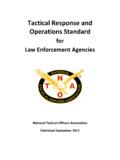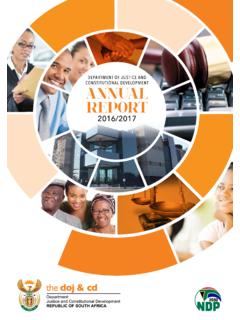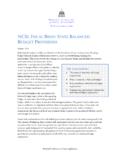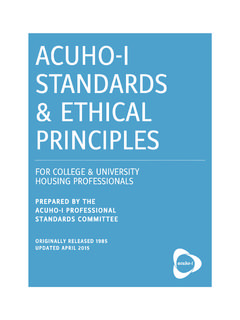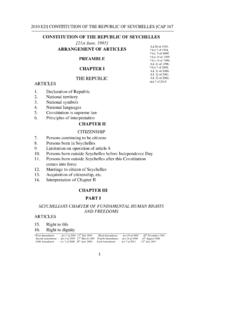Transcription of CONSTITUTIONAL COURT OF SOUTH AFRICA - …
1 CONSTITUTIONAL COURT OF SOUTH AFRICA Case CCT 101/17 In the matter between: AFRIFORUM First Applicant SOLIDARITY Second Applicant and UNIVERSITY OF THE FREE STATE Respondent Neutral citation: AfriForum and Another v University of the Free State [2017] ZACC 48 Coram: Mogoeng CJ, Nkabinde ADCJ, Cameron J, Froneman J, Jafta J, Khampepe J, Madlanga J, Mhlantla J, Mojapelo AJ, Pretorius AJ and Zondo J Judgments: Mogoeng CJ (majority): [1] to [81] Froneman J (dissenting): [82] to [135] Decided on: 29 December 2017 Summary: Section 29 of the Constitution - Higher Education Act Ministerial language policy Promotion of Administrative Justice Act Administrative action Legality review Reasonable practicability Legal standing 2 ORDER On appeal from the Supreme COURT of Appeal (hearing an appeal from the High COURT of SOUTH AFRICA , Free State Division, Bloemfontein): 1.
2 Leave to appeal is refused. 2. There will be no order as to costs. JUDGMENT MOGOENG CJ (Nkabinde ADCJ, Jafta J, Khampepe J, Madlanga J, Mhlantla J, Mojapelo AJ and Zondo J concurring): Essential context [1] Whenever we seek to resolve disputes that have the potential to divide our people along racial lines or exacerbate pre-existing divisions, a proper context would always be essential. This is such a case. It raises a real but unarticulated question whether Afrikaans has been downgraded from the status of a major medium of instruction for genuine and constitutionally sound reasons or in the furtherance of some historical and insensitive score-settling agenda.
3 And the following remarks made by this COURT in relation to language as a medium of instruction are some of the indispensable ingredients for the necessary context: [45] Apartheid has left us with many scars. The worst of these must be the vast discrepancy in access to public and private resources. The cardinal fault line of our past oppression ran along race, class and gender. It authorised a hierarchy of privilege and disadvantage. Unequal access to opportunity prevailed in every domain. Access to private or public education was no exception.
4 While much MOGOENG CJ 3 remedial work has been done since the advent of CONSTITUTIONAL democracy, sadly deep social disparities and resultant social inequity are still with us. [46] It is so that white public schools were hugely better resourced than black schools. They were lavishly treated by the apartheid government. It is also true that they served and were shored up by relatively affluent white communities. On the other hand, formerly black public schools have been and by and large remain scantily resourced.
5 They were deliberately funded stingily by the apartheid government. Also, they served in the main and were supported by relatively deprived black communities. That is why perhaps the most abiding and debilitating legacy of our past is an unequal distribution of skills and competencies acquired through education. [47] In an unconcealed design, the Constitution ardently demands that this social unevenness be addressed by a radical transformation of society as a whole and of public education in particular.
6 1 [2] These truths and the demand for radical transformation apply with equal force to those of our universities where Afrikaans was the sole medium of instruction. They were exceedingly well-resourced for the exclusive or primary benefit of white Afrikaner students. And their inseparable and almost destiny-defining mandate was to develop the Afrikaans language very well. As a result, it now effortlessly and admirably fits President Mandela s poetic description of it as a language of scholarship and science .2 Sadly, all African universities and languages were deliberately starved of resources and capacities critical for a similar developmental agenda.
7 Alive to this inequity and deliberate prejudice, it was deemed prudent to have this sobering reminder annexed to the ministerial language policy framework, that is central to this application, so as to give it the vital context which could easily elude many, and deflate the transformation project of its critical zest and legitimacy: 1 Head of Department, Mpumalanga Department of Education v Ho rskool Ermelo [2009] ZACC 32; 2010 (2) SA 415 (CC); 2010 (3) BCLR 177 (CC) (Ermelo) (per Moseneke DCJ) at paras 45-7.
8 2 Mandela Address by President Nelson Mandela on the occasion of his acceptance of an honorary doctorate of the University of Stellenbosch (25 October 1996), available at MOGOENG CJ 4 The level of development attained by the Afrikaans language is in demonstrable ways connected to aspects of history of colonial-settler domination and particularly in its latter phases to the dominant position of a sector of the Afrikaans-speaking communities in the apartheid order. Afrikaans became the language most closely associated with the formalisation and execution of apartheid.
9 To a great proportion of SOUTH Africans it probably calls up first and foremost associations of discrimination, oppression and systematic humiliation of others. These associations understandably often affect the approaches people take to the role and future of Afrikaans. That history of association with racism and racially based practices is often one that Afrikaans-speaking communities will have to confront and deal with. That is part of the challenge of healing, reconciliation and reparation our society will continue to face for a considerable time to come.
10 3 [3] Issues around language policy are as emotive as the language itself. This would be especially so where plans are afoot to effect changes that would water down the role or usage of language, particularly Afrikaans. For, Afrikaans has for many years been associated with dominion or power. Those whose mother tongue it is once ruled this country. And everything official had to also be in Afrikaans. It was a compulsory subject for all African learners and all law students. In at least five of our universities,4 Afrikaans was the only medium of instruction for decades.










